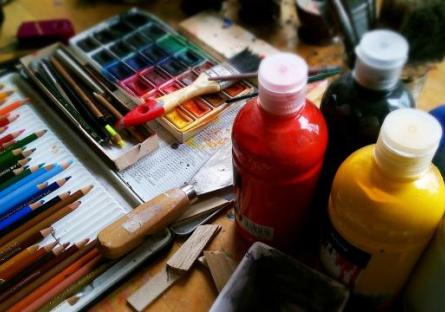This article appears for archival purposes. Any events, programs and/or initiatives mentioned may no longer be applicable.

Kurt Vonnegut once wrote: "Practice any art, music, singing, dancing, acting, drawing, painting, sculpting, poetry, fiction, essays, reportage, no matter how well or badly, not to get money and fame, but to experience becoming, to find out what's inside you, to make your soul grow.” The author of such classic works as Cat’s Cradle and Mother Night taps into something that’s essential about making art: the very act of it is reward enough. But the truth is that there are other concrete rewards that come from pursuing art as a hobby or vocation.
Making art can improve your mental health and have a positive impact on your physical health as well. Here are just a few of the ways that being artistic can enhance your well-being.
Stress Relief
Studies have shown that creative expression can help people process and alleviate depression and anxiety. Making art can lower your cortisol levels, which can reduce your overall level of stress. There have also been findings that suggest art as a group activity can have an even more dramatic effect on reducing your stress levels, which is why art therapy can be so effective in helping people manage their trauma.
Rewarding Behavior
Even doing something as low commitment as doodling on paper can have an impact. Researchers have found that the process of doing artistic activities can increase blood flow to the brain’s medial prefrontal cortex. This is the brain’s reward center, where dopamine helps regulate a variety of mental functions that include memory, judgment, and impulse control. Dopamine makes you feel good and creates feelings of being rewarded. It’s a neurochemical motivator that you can tap into through regular artistic practice.
Flow
Another benefit of engaging in artistic practice is that it can induce a state of flow. The “flow state” is a mental state where someone becomes completely focused on an activity. This mental state is very similar to the state of “no-mind” that meditation fosters. Being in this mindful space has a variety of benefits that include:
- Reduces stress
- Eases anxiety
- Improves sleep
- Manages pain
- Decreases blood pressure
- Boosts Memory
Did you know that drawing is a more effective form of memory retention than taking notes? Studies have found that art draws on multiple types of experience: semantic, motor, and visual. These three, working in concert, make it easier to recall memories because you're pulling it from several different senses and perceptions (it's easier to remember a specific kite after drawing it than looking at the word "kite" and making that association).